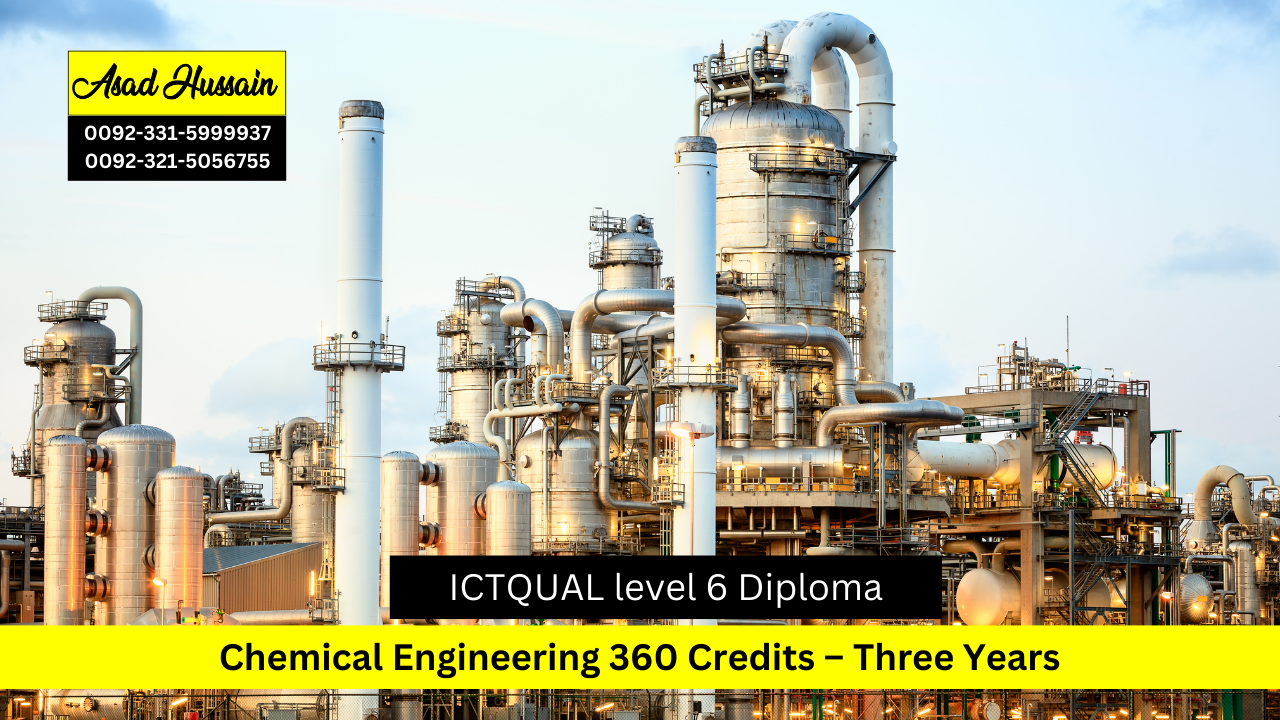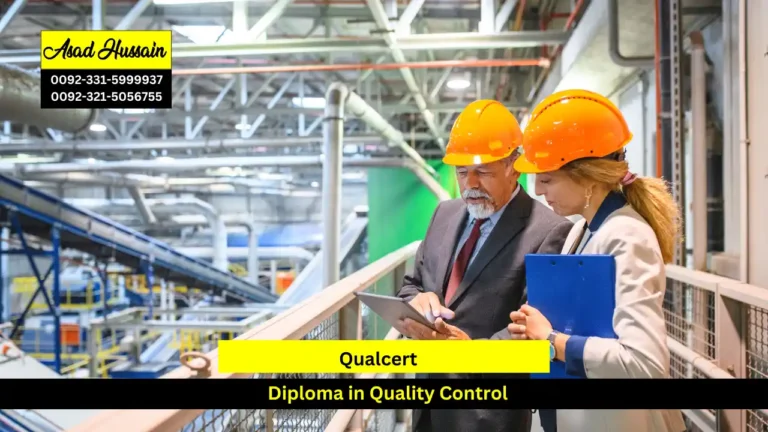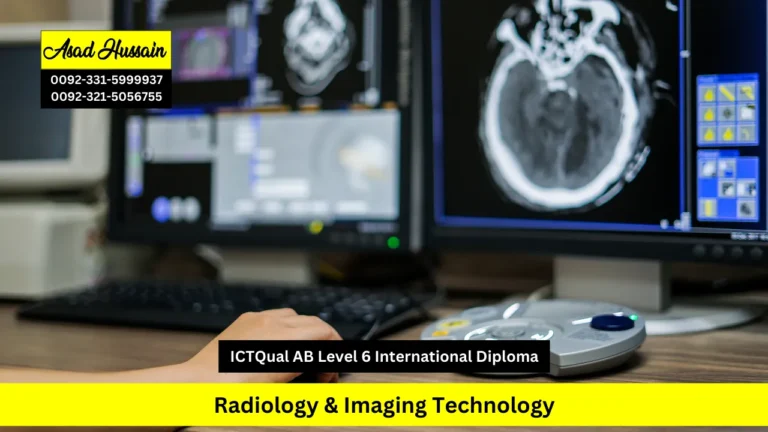The ICTQual Level 6 Diploma in Chemical Engineering is an advanced qualification designed for individuals looking to pursue a career in chemical engineering. With a focus on developing technical expertise, practical knowledge, and industry-relevant skills, this diploma equips students with the tools they need to thrive in this dynamic field. This blog will delve into the structure, benefits, career prospects, and how this qualification stands out in the industry.
The ICTQual Level 6 Diploma in Chemical Engineering is a comprehensive, three-year qualification that provides learners with 360 credits. It is designed for those aiming to work at a higher level in the field of chemical engineering, whether as part of a research and development team, within manufacturing, or in other key industry roles. This diploma includes a broad range of topics, including process design, industrial chemistry, thermodynamics, fluid mechanics, and plant operation, ensuring that students develop both theoretical knowledge and practical application skills.
The ICTQual Level 6 Diploma in Chemical Engineering is an excellent choice for anyone looking to build a successful career in this exciting and fast-evolving field. With a solid educational foundation, a mix of theoretical and practical training, and strong industry recognition, graduates will be well-positioned to succeed in various high-demand roles. The three-year program ensures students gain a comprehensive understanding of chemical engineering principles and processes, making them valuable assets to potential employers. Whether you’re entering the field for the first time or looking to advance your career, the ICTQual Level 6 Diploma offers the skills, experience, and credibility to help you achieve your professional goals.
Program Highlights
Year 1: Foundation of Chemical Engineering
- Introduction to Chemical Engineering
- Basic Thermodynamics
- Mathematics for Chemical Engineers
- Fluid Mechanics
- Material and Energy Balances
- Introduction to Process Control
- Chemistry for Chemical Engineers
- Introduction to Reaction Engineering
- Engineering Drawing and CAD
- Professional Skills Development
- Heat and Mass Transfer Fundamentals
- Chemical Engineering Principles
Year 2: Advanced Chemical Engineering Concepts
- Advanced Thermodynamics
- Heat Transfer
- Mass Transfer Operations
- Chemical Process Design
- Industrial Chemistry
- Process Systems Engineering
- Fluid Dynamics and Flow Systems
- Reaction Engineering
- Environmental Engineering
- Process Control and Automation
- Process Modeling and Simulation
- Engineering Materials
Year 3: Specialization and Industry Application
- Advanced Process Control
- Process Safety and Risk Management
- Chemical Plant Design
- Sustainable Chemical Engineering
- Separation Technology
- Computational Fluid Dynamics (CFD)
- Advanced Materials Science
- Process Optimization
- Industrial Placement / Internship
- Capstone Project
- Project Management for Chemical Engineers
- Biochemical Engineering
To enroll in the ICTQual Level 6 Diploma in Chemical Engineering (360 Credits – 3 Years), candidates must meet the following entry requirements:
- Educational Qualifications: Applicants should hold a Level 5 qualification, such as a diploma, certificate, or equivalent, in a related field. A strong foundation in subjects like chemistry, physics, mathematics, or engineering is highly recommended, as the course builds upon these core concepts in chemical engineering.
- Age Requirement: Candidates must be at least 18 years old to ensure they possess the maturity and responsibility needed to manage both the academic and practical aspects of the program.
- English Proficiency: Proficiency in English is essential, as students will need to comprehend technical terminology, complete written assignments, and effectively communicate within the chemical engineering field.
- Technical Skills: Basic computer literacy is required, as the program involves assignments, simulations, and the use of engineering software for process design and analysis.
- Relevant Experience (Optional): While not a requirement, prior experience in chemical engineering concepts, laboratory practices, or industrial processes can be beneficial, providing an advantage and enhancing overall performance throughout the program.
Here are the Learning Outcomes for each study unit in the ICTQual Level 6 Diploma in Chemical Engineering (360 Credits – Three Years):
Year 1: Foundation of Chemical Engineering
- Introduction to Chemical Engineering
Understand the core concepts and principles of chemical engineering, including its history and industrial applications. - Basic Thermodynamics
Apply the first and second laws of thermodynamics to chemical processes and solve related engineering problems. - Mathematics for Chemical Engineers
Use mathematical techniques such as calculus, differential equations, and linear algebra to solve chemical engineering problems. - Fluid Mechanics
Demonstrate knowledge of fluid properties and behavior, and apply fluid flow principles to chemical engineering systems. - Material and Energy Balances
Solve material and energy balance problems for chemical processes, considering inputs, outputs, and transformations. - Introduction to Process Control
Understand basic process control concepts, including the role of sensors, actuators, and controllers in managing chemical processes. - Chemistry for Chemical Engineers
Apply principles of organic, inorganic, and physical chemistry to solve engineering problems in the chemical industry. - Introduction to Reaction Engineering
Understand chemical reaction rates and equilibrium and apply basic principles of reaction engineering in simple processes. - Engineering Drawing and CAD
Develop technical drawings and use computer-aided design (CAD) software to create models and design chemical engineering systems. - Professional Skills Development
Enhance communication, teamwork, and problem-solving skills, while demonstrating professionalism in engineering contexts. - Heat and Mass Transfer Fundamentals
Understand the principles of heat and mass transfer, and apply these to simple engineering processes. - Chemical Engineering Principles
Develop a solid understanding of core chemical engineering principles and their integration in chemical production systems.
Year 2: Advanced Chemical Engineering Concepts
- Advanced Thermodynamics
Analyze complex thermodynamic systems, including phase equilibrium, chemical reactions, and energy-efficient process design. - Heat Transfer
Apply heat transfer principles in chemical engineering systems, focusing on conduction, convection, and radiation. - Mass Transfer Operations
Solve problems involving mass transfer in processes such as distillation, absorption, and filtration, with an emphasis on separation technologies. - Chemical Process Design
Apply process design techniques to create efficient and safe chemical processes, including the design and optimization of chemical reactors. - Industrial Chemistry
Understand the application of chemical processes in industrial settings, focusing on materials, catalysts, and large-scale reactions. - Process Systems Engineering
Apply systems thinking and engineering methods to optimize and simulate chemical production processes for efficiency and sustainability. - Fluid Dynamics and Flow Systems
Analyze fluid dynamics in engineering systems, including pipe design and pump operation, ensuring efficient material transport. - Reaction Engineering
Apply advanced principles of reaction kinetics and reactor design to optimize chemical reaction processes in industrial applications. - Environmental Engineering
Understand the environmental impacts of chemical processes and apply sustainable practices to minimize pollution and optimize resource use. - Process Control and Automation
Apply advanced control systems and automation technologies to maintain optimal conditions in chemical processing plants. - Process Modeling and Simulation
Use simulation software to model and optimize chemical processes, predicting outcomes and improving system efficiency. - Engineering Materials
Understand the properties and selection of materials used in chemical processes, considering durability, corrosion resistance, and thermal stability.
Year 3: Specialization and Industry Application
- Advanced Process Control
Design and implement advanced process control systems, including distributed control systems (DCS) and real-time process monitoring. - Process Safety and Risk Management
Identify potential hazards in chemical processes, apply risk assessment techniques, and design systems to prevent accidents and ensure safety. - Chemical Plant Design
Design and analyze chemical plants, integrating process flow, equipment selection, and safety protocols. - Sustainable Chemical Engineering
Apply sustainable practices in chemical engineering, focusing on green chemistry, renewable energy, and reducing environmental impact. - Separation Technology
Apply separation techniques such as membrane filtration, distillation, and chromatography to optimize chemical production processes. - Computational Fluid Dynamics (CFD)
Use CFD software to model fluid flow, heat transfer, and chemical reactions in complex engineering systems. - Advanced Materials Science
Analyze the properties and applications of advanced materials in chemical engineering, with a focus on technologies such as nanomaterials. - Process Optimization
Apply optimization techniques to improve the efficiency, cost-effectiveness, and sustainability of chemical processes. - Industrial Placement / Internship
Gain real-world experience in the chemical engineering industry, applying learned concepts and gaining practical skills. - Capstone Project
Undertake an independent research or design project that integrates knowledge from across the curriculum to solve a complex engineering problem. - Project Management for Chemical Engineers
Develop project management skills, including scheduling, budgeting, and coordinating multidisciplinary teams to complete engineering projects. - Biochemical Engineering
Understand the principles and applications of biochemical engineering, focusing on bioreactors, fermentation, and bioprocess design.
The ICTQual Level 6 Diploma in Chemical Engineering (360 Credits – Three Years) is designed for individuals who are seeking to build a solid foundation in chemical engineering and pursue a career in this dynamic and highly technical field. This course is ideal for:
1. Aspiring Chemical Engineers:
Individuals who are interested in pursuing a career as chemical engineers and wish to gain comprehensive knowledge and skills in process design, thermodynamics, reaction engineering, and more. It is an excellent starting point for those wanting to enter the chemical engineering profession.
2. Current Professionals Looking to Upskill:
The course is suitable for those already working in related fields (e.g., process operators, technicians, or engineers) who wish to formalize and expand their knowledge, particularly in advanced chemical engineering concepts, process control, and design. It provides an opportunity for career advancement and professional growth.
3. Students with a Background in Science or Engineering:
Those who have a diploma or equivalent qualifications in science (such as chemistry, physics, or mathematics) or engineering can benefit from this course, which builds upon existing knowledge to develop more specialized skills in chemical engineering.
4. Graduates of Related Fields:
Individuals with a Level 5 qualification in a related discipline (such as engineering, environmental science, or applied chemistry) looking to deepen their understanding of chemical engineering concepts and transition into more specialized roles within the industry.
5. Those Interested in Sustainable Engineering:
The course places a strong emphasis on sustainable chemical engineering practices, green chemistry, and environmental engineering. It is suitable for individuals passionate about contributing to sustainability in the chemical and manufacturing sectors.
6. Individuals Seeking a Pathway to a Degree or Advanced Studies:
For those considering further education, the ICTQual Level 6 Diploma provides a pathway to a Bachelor’s degree or a Master’s degree in chemical engineering or related fields. It equips students with the technical expertise and qualifications to pursue higher academic studies.
7. Career Changers:
People from other fields who are keen to transition into chemical engineering can take advantage of the course’s broad foundational and practical content to switch careers.







